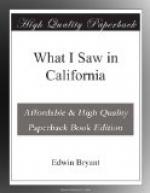“Well, who wouldn’t be a soldier and fight for California?”
“You are mistaken,” I replied.
Rubbing his eyes, he gazed at me with astonishment, as if having been entirely unconscious of my presence; but, reassuring himself, he said:
“How mistaken?”
“Why,” I answered, “you are not fighting for California.”
“What the d——l, then, am I fighting for?” he inquired.
“For TEXAS.”
“Texas be d——d; but hurrah for General Jackson!” and with this exclamation he threw himself back again upon his wooden pillow, and was soon snoring in a profound slumber.
Making a platform composed of sticks of wood upon the soft mud, I stripped myself to the skin, wringing the water from each garment as I proceeded. I then commenced drying them by the fire in the order that they were replaced upon my body, an employment that occupied me until daylight, which sign, above the high mountain to the east, down which we had rolled rather than marched yesterday, I was truly rejoiced to see. Distance 3 miles.
December 26.—Parties were detailed early this morning, and despatched up the mountain to bring down the cannon, and collect the living horses and baggage. The destruction of horse-flesh, by those who witnessed the scene by daylight, is described as frightful. In some places large numbers of dead horses were piled together. In others, horses half buried in the mud of the ravines, or among the rocks, were gasping in the agonies of death. The number of dead animals is variously estimated at from seventy-five to one hundred and fifty, by different persons. The cannon, most of the missing baggage, and the living horses, were all brought in by noon. The day was busily employed in cleansing our rifles and pistols, and drying our drenched baggage.
December 27.—Preparations were commenced early for the resumption of our march; but such was the condition of everything around us, that it was two o’clock, P.M., before the battalion was in readiness; and then so great had been the loss of horses in various ways, that the number remaining was insufficient to mount the men. One or two companies, and portions of others, were compelled to march on foot. We were visited during the forenoon by Mr. Sparks, an American, Dr. Den, an Irishman, and Mr. Burton, another American, residents of Santa Barbara. They had been suffered by the Californians




